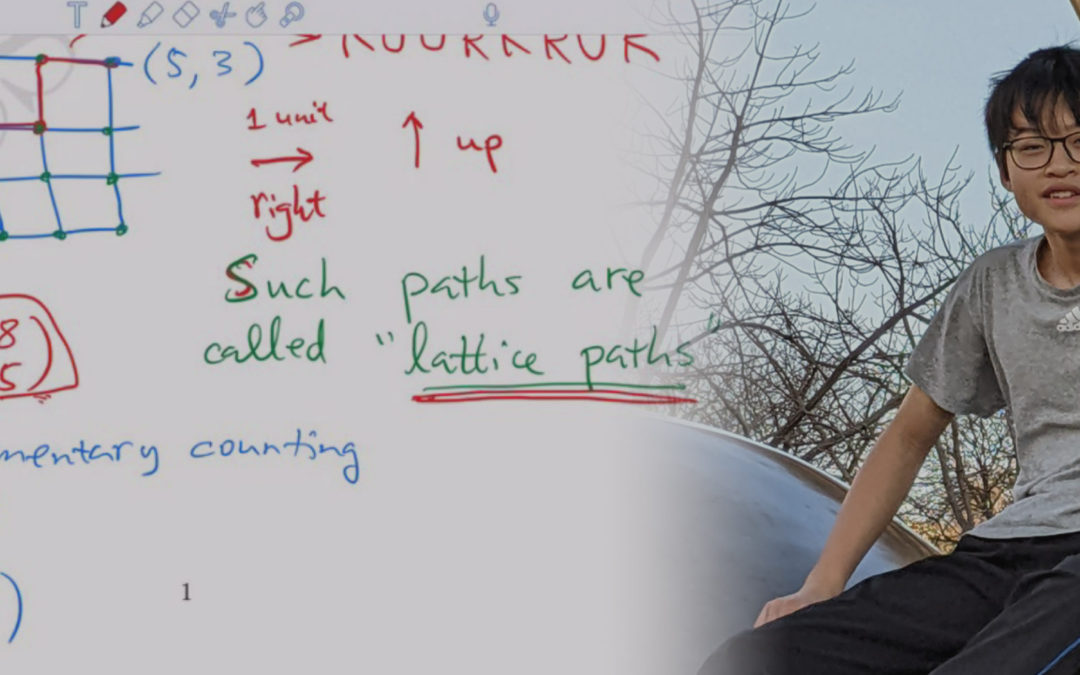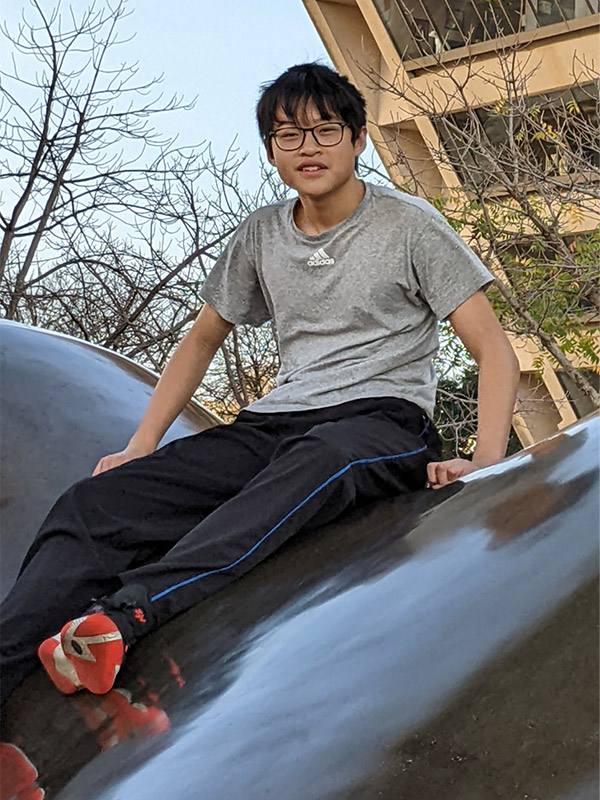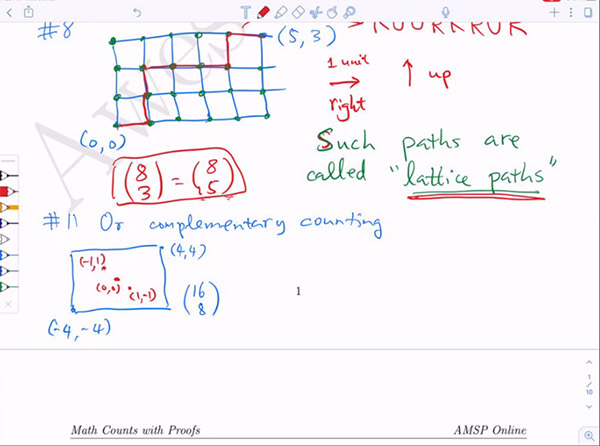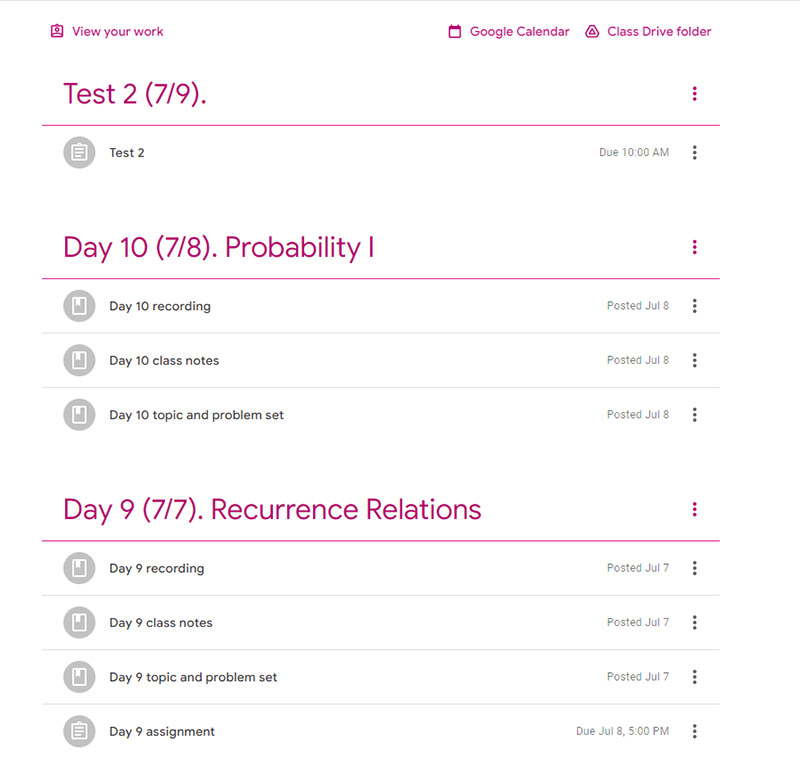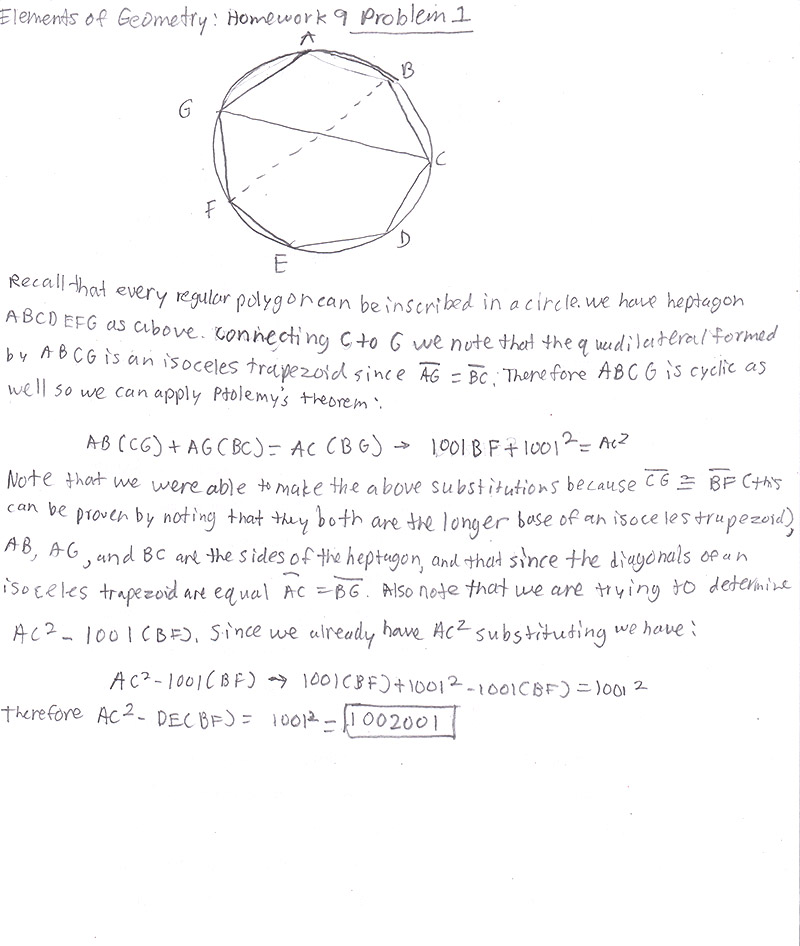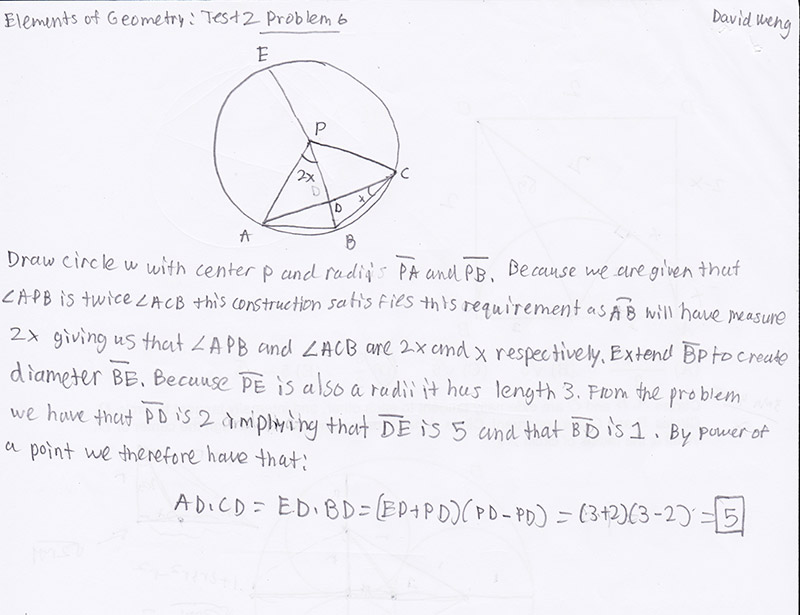David Weng reports on his experiences at AwesomeMath, studying Elements of Geometry and Math Counts with Proofs.
“As my first week of AwesomeMath draws to a close, I can confidently say that this experience so far has been immensely rewarding, one that I will remember. For my classes, I selected Elements of Geometry and Math Counts with Proofs, since I am especially weak in these two subjects and felt that touching up on the basics in those areas would be beneficial in improving my problem-solving skills. Both of these courses maintain a certain level of rigor, that while at first caught me off guard, I was soon able to adapt to and appreciate as it has helped me grow tremendously. The lecture notes, provided by the instructors to help guide us through their teachings, as well as the problem sets, that allowed us to apply the concepts we had previously learned have been key to keeping me on track, allowing me to absorb the most I can out of this prestigious summer camp,” David explains.
“The format of classes here remain constant throughout the camp, with a 1.5 hour lecture followed by a 1 hour problem-solving session. During the lecture portion, we usually start off by going through yesterday’s homework, as well as any other problems that might have been particularly challenging. From here, we are then treated to a new topic, with many problems following suit that show how this concept can be applied to solve these problems. As for the problem-solving session, we are able to ask for help on any problems either on the homework or problem set, to which either the instructor or their assistants will gently nudge us along by dropping one or two useful hints. Sometimes these little insights are all it takes for me to complete a problem, that only a few seconds ago I was sure would be impossible. If more help is needed, AwesomeMath has allotted a specific time frame on Wednesdays and Fridays for students to ask their teachers if they require more help. These office hours have become something that I look forward to as they allow me to spend more 1 on 1 time with my teacher. Finally, the last thing to note is that this Saturday there were tests in both of my classes, each spanning 2 hours with roughly 6 problems each. Partial credit was given, as we were reminded that even if we were not able to come up with a final answer, our approach to a particular problem was also important,” David adds.
David has been building his mathematical skills via this course and is thankful for the experience.
“Regarding the work load that AwesomeMath has, while it is at times challenging to keep up, ultimately each problem has a specific purpose, cultivating my skills even further. With this rigorous amount of problems to do after each class, this has forced me to grow in both learning how to control my time wisely and forming study habits to review what has been covered. While this first week of AwesomeMath has been difficult to navigate through, I believe that it will have a profound impact on my mathematical ability in the future, and for that I cannot thank Garwin enough,” David says.
During his second week at AwesomeMath, David reports that the work is becoming more complicated and challenging. Recorded sessions, lecture notes, and collaboration with fellow students have helped David to successfully complete homework assignments as he progresses in the course. David has also been exploring new mathematical horizons by not only learning how to solve a problem, but also learning why the method works.
“This proof-based approach is the core of these classes, as the instructors wholeheartedly believe that this way of learning correlates to better retention and development of knowing when to apply a certain concept, a philosophy to which I can attest. While some of my math classes in school acknowledged that proofs were essential, they never used them to their full extent and only covered a few basic ones. Even though this environment has been nothing short of demanding, it has pushed me to grow in ways that I could have never imagined,” David explains.
David states that the different teaching styles of his instructors have really helped him understand and work with the course material.
“Elements of Geometry provides an in-depth analysis of synthetic geometry or Euclidian geometry that does not rely on the use of the coordinate plane. My instructor, Patrick McClintock, has been amazing in breaking down complicated theorems into more manageable ones that we have previously seen, building up from what we already know and deriving something entirely new, something that I have grown to appreciate as we have slowly started to shift our focus on circles. Giving us the chance to work alongside with him during class time, and always ready to provide us a helpful hint, albeit ones that sometimes seem to be useless, I have found myself gaining more respect for him as the days pass. The two teacher assistants have also fulfilled their respective roles, while also going beyond what is typically expected of them. While they grade my homework like normal, awarding partial credit generously, they are also quick to point out exactly where I have gone astray, as well as suggest alternative solutions that could have been much more efficient,” David says.
“Li Zhao, my instructor for my second class, abides by something that he calls the Erdos principle; whenever a problem has a numerical answer that can be expressed nicely, there usually is an underlying method to be determined. So, whenever we go over a problem, he usually starts by first utilizing the concepts we have already discussed, before branching out and finding a solution that is more “cleaner” than the one originally shown. Many discredit combinatorics as a field of mathematics that is trivial and obvious, yet so far this class has completely altered my perspective. While most can confidently boast that they can count, sometimes certain problems make it difficult to figure out exactly what should be counted and the most effective method to be used. Giving me a greater appreciation for this often-misunderstood branch of mathematics, Math Counts with Proofs has continued to prove to be an invigorating experience,” David explains.
“These two different teaching styles, as well as a present social setting, provide an experience that continues to be rigorous yet uplifting at the same time, as I have been exposed to so many new ideas that I am sure will be useful, whether that be through competitions, my mathematical ability in the classroom, or the critical thinking skills that are constantly sharpened through the exposure of complicated mathematics,” David adds.
Although the classes have been held online via Zoom, David has had opportunities to connect with other students after class through activities, such as online games and trivia.
“These outlets allow for some entertainment, while also simultaneously serving as a place where everyone can forget about math, at least for a little bit. Personally, I have befriended someone in my counting class, where we help each other figure out how to continue on a particular problem. This collaborative effort outside of the classroom has saved me tremendous time on the problem sets assigned daily, as I sometimes get stuck on a particular condition that he helps me work through and vice versa,” David says.
As his AwesomeMath experience comes to a close, David says that the courses have helped strengthen his mathematical problem-solving skills. In addition, he is greatly appreciative of being a GFF sponsorship recipient.
“Serving as an excellent resource in strengthening my mathematical problem-solving skills, AwesomeMath has hammered in the basics while simultaneously introducing me to more advanced topics. Providing a plethora of problems, pleasant teachers, and a community consisting of people all across the globe who desire to improve themselves daily, this summer program will continue to remain a highlight of my year. One might question why anyone would spend a considerable amount of time and effort in learning another theorem or practicing another problem set, especially since it seems that all of this effort goes to waste in a real-world setting. However, AwesomeMath has been keen on emphasizing that while teaching mathematics can help students increase competition scores, their true focus lies in sharpening logical reasoning and grit in tackling tough problems, both of which were heavily utilized throughout my time here in my two classes Elements of Geometry and Math Counts with Proofs,” David says.
“The Garwin Family Foundation has provided me with an amazing opportunity, as the knowledge I have gained, friends made, and the well-written handouts will continue to serve as resources that will further my competition mathematical abilities. Such a summer program has allowed me to pursue what I enjoy the most and will be one that I remember indefinitely. Thank you once again GFF for this wonderful experience,” David exclaims!
We have faith in your ability to succeed in Mathematics, David. Keep up the good work!
>> Read David Weng’s final report (PDF file, 82 KB).
>> Learn about other students’ experiences in the GFF Scholarship Program.

